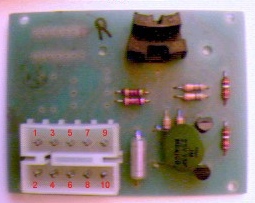Difference between revisions of "Trackballs"
(→2.25" Trackballs) |
(→4.5" Atari Trackballs (Missile Command, Atari Football)) |
||
| Line 21: | Line 21: | ||
Any 4.5" diameter ball, particularly a candle-pin and/or duck-pin bowling ball, is a swap-out replacement for the 25+ year old originals. | Any 4.5" diameter ball, particularly a candle-pin and/or duck-pin bowling ball, is a swap-out replacement for the 25+ year old originals. | ||
| − | The original optical boards on these are fairly easy to interface with an [[Optical_Encoders#Opti-PAC|Opti-PAC]] (and therefore most other [[Optical_Encoders|optical control interfaces]]). This is the pin-out for the 10-pin molex plug found on the optical boards: | + | The original optical boards on these are fairly easy to interface with an [[Optical_Encoders#Opti-PAC|Opti-PAC]] (and therefore most other [[Optical_Encoders|optical control interfaces]]). |
| + | |||
| + | ==== This is the pin-out for the 10-pin molex plug found on the optical boards: ==== | ||
[[Image:Atari_Steering.jpg|right]] | [[Image:Atari_Steering.jpg|right]] | ||
{| | {| | ||
Revision as of 01:10, 3 March 2006
This page should contain brief descriptions of various trackballs available, and details of their setup. If any one portion of the page starts getting a little too long, a seperate page may be started for that topic.
Contents
Mini Trackballs
2.25" Trackballs
Available from Happ, Suzo, Ultimarc and others.
Two and a quarter inches is the same size as a (U.S.) regulation billiard ball.
3" Trackballs
Available from Happ, Suzo, Ultimarc and others.
4.5" Atari Trackballs (Missile Command, Atari Football)
These giant trackballs are sometimes known as 4-inch, but are actually four and a half inches in diameter. They were some of the first trackballs put into use, and are made of machined aluminum; clearly designed to survive intense abuse.
Putting one of these in your control panel is quite a commitment in terms of real estate. The metal frame is 6" square, 3.5" tall, and the optical boards stick an aditional 2 inches beyond two of the corners, an effective 64 square inch footprint.
Happ sells a 4.5" trackball. The ball itself is usable in an Atari 4.5" (a 4.5" diameter sphere is a 4.5" diameter sphere), but the mechanism itself is a different, less industrial design.
Any 4.5" diameter ball, particularly a candle-pin and/or duck-pin bowling ball, is a swap-out replacement for the 25+ year old originals.
The original optical boards on these are fairly easy to interface with an Opti-PAC (and therefore most other optical control interfaces).
This is the pin-out for the 10-pin molex plug found on the optical boards:
| 1 | no signal |
| 2 | no signal |
| 3 | no signal |
| 4 | Axis 1 |
| 5 | no signal |
| 6 | no signal |
| 7 | no signal |
| 8 | Axis 2 |
| 9 | +5v |
| 10 | ground |
There were a number of slightly different boards with this same pin-out.
On an Opti-PAC, the "A/HI" jumper should be set.
There are a few vendors, particularly The Real Bob Roberts, that sell replacement bearings and steel roller-shafts for these (they are often referred to as 4" trackball rollers).
